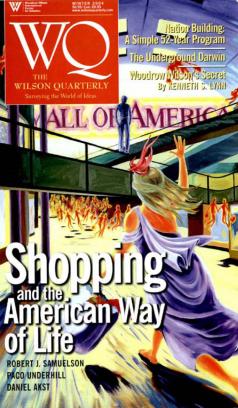Shopping and the American Way of Life


Arms control once held center stage in U.S. foreign policy, but it has quietly faded away.
Do American presidents really need a war to prove their worth?
What makes life worth living, according to Albert Camus.
An assessment of the Bush administration's controversial "faith-based initiatives."
More and more female executives are walking away from the rat race.
Has the U.S.-led war in Iraq rendered the UN irrelevant?
Ousting Saddam Hussein and his Baath Party is only the first step in what promises to be a long, difficult process in Iraq.
A closer look at Jefferson's slaveholding practices.
Did Kennedy have a covert plan to withdraw from Vietnam?
Coups seem pretty much a thing of the past...except in Africa.
Rethinking the Sullivan case.
Some varying prescriptions to "cure" organized labor.
Should we worry about Pakistan's nuclear arsenal?
How did Enlightenment thinkers get so much done? Caffeine!
The terrorist threat may suggest otherwise, but major war may be a thing of the past.
Despite the economic hardships of the Depression era, the decade of the 1930s was one of America's most technologically productive periods.
There's plenty of cause for concern, but the media mostly worries about the wrong stuff.
A longtime Mideast observer believes that a Jewish state is an anachronism.
Low interest rates have been a boon to homeowners but a disaster for retirees. Something's got to give.
The purported shortage of native-born scientific researchers seems to lack just one thing: hard evidence.
Thinking about forgeries makes a noted critic wonder about the nature of art itself.
Mental health care is rife with problems, but a recent government commission may have pointed the way towards some solutions.
The elusive anti-aging pill may already be in our medicine cabinet.
Exploring society's public and private failings, Erich Fischl has emerged as a leader of a return to figurative art.
The record industry could learn things from a successful young subway musician.
European elites generally are in favor of the EU, but the citizenry has reservations.
By Andrew Meier. Norton. 511 pp. $28.95
THE ENCYCLOPEDIA OF IRELAND. Edited by Brian Lalor. Yale Univ. Press. 1218 pp. $65
IN DENIAL: Historians, Communism and Espionage. By John Earl Haynes and Harvey Klehr. Encounter. 316 pp. $25.95
Reviewed by David J. Garrow
A new biography reveals the major themes of one of America's most important early writers: Sorrow and imprisonment, the terrible influence of family history and names, the past with its mysterious power over the present.
By David Foster Wallace. Norton.319 pp. $23.95
LIGHTNING MAN: The Accursed Life of Samuel F. B. Morse. By Kenneth Silverman. Knopf. 503 pp. $35
TOMMY THE CORK: Washington’s Ultimate Insider, from Roosevelt to Reagan. By David McKean. Steerforth. 347 pp. $25
THE NORMAN PODHORETZ READER: A Selection of His Writings from the 1950s through the 1990s. Edited by Thomas L. Jeffers. Free Press. 478 pp. $35
EVERYTHING WAS POSSIBLE: The Birth of the Musical Follies. By Ted Chapin. Knopf. 331 pp. $30
TILT: A Skewed History of the Tower of Pisa. By Nicholas Shrady. Simon & Schuster. 161 pp. $21.95
TILT: A Skewed History of the Tower of Pisa. By Nicholas Shrady. Simon & Schuster. 161 pp. $21.95
By Michael Dirda. Norton. 335 pp.$24.95
IN THE GHOST COUNTRY: A Lifetime Spent on the Edge. By Peter Hillary and John E. Elder. Free Press. 341 pp. $26
Nearly 60 years ago, Americans marched into a small, ravaged country thousands of miles distant, determined to transform it into a modern nation. They could not have imagined how successful they would be—or how long the transformation would take.
What does the future hold for America's consumer economy treadmill?
Americans have it all. So why do we feel so guilty?
“The subject may appear an insignificant one,” Charles Darwin conceded, “but we shall see that it possesses some interest.” Earthworms were the subject, and Darwin’s lifelong fascination with them revealed as much about the unique qualities of his mind as it did about the surprising effects of the creatures’ subterranean labors.
Woodrow Wilson’s struggle withphysical affliction—which emerged long before the famous stroke that crippled the last part of his presidency—may have been admirable, but its secret nature compromised Wilson’s own values—and raises the question of how different history might have been had the American public been told the truth.
I am called a retail anthropologist, which makes me uncomfortable, especially around my colleagues in academia who have many more degrees than I do. For whatever combination of reasons, I’ve spent my adult life studying people while they shop. I watch how they move through stores and other commercial environments—restaurants, banks, fastfood joints, movie theaters, car dealerships, post offices, concert halls, malls.